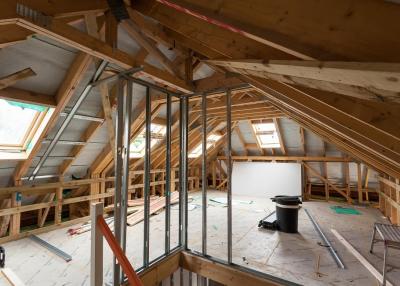Accurate installation of Knauf insulation for real performance
To deliver real thermal performance within a masonry cavity wall construction, it’s essential that the insulation is tightly fitted to the inner leaf of the cavity and that individual insulation slabs are tightly butted together. This will prevent cold air from getting through the insulation layer.
If this isn’t done there’s a greater chance of thermal bypass, made worse by thermal gradients and/or differential pressures in the cavities. The same principles apply to floors and roofs but can influence insulation materials in different ways.
Warm roof constructions in traditional slated and tiled roofs are under even greater influence of air movement making the need for correct design and accurate installation even greater.
Independent research into the issue of poor installation of insulation in masonry cavity walls has highlighted this potential for heat loss.
| Construction | Calculated U-value W/m2K |
Measured U-values W/m2K | |
| Good workmanship | Poor workmanship | ||
| Built in Full Fill mineral wool slabs | 0.22 | 0.22 |
0.40 |
The research covers different types of insulation and the results presented should be taken in context with their actual site specifics rather than an ability to compare products. However, there is widespread recognition of the problem and the Zero Carbon Hub Builders Book highlights this issue and offers tips and hints to prevent them.
Manufacturers are constantly looking to improve installation issues. For example, Earthwool® DriTherm Cavity Slabs are designed to fully fill the building’s cavity with a natural resilient layer that accommodates normal building tolerances. Also, because the slabs are 455mm wide (5mm greater than the standard wall tie spacing) the slab will give way to accommodate, rather than be disrupted by, the profile of standard wall ties.
The combination of these two features minimises the possibility of any gaps at the horizontal slab joints when the coursing of the block work is correct. You will still need to check whether a full fill insulation solution is suitable for your locality.
Further information
Brick Cavity Walls: A Performance Analysis Based on Measurements and Simulations by H. Hens, A. Janssens, W. Depraetere, J. Carmeliet and J. Lecompte
Sign up to the building bulletin newsletter
Over 48,000 construction professionals have already signed up for the LABC Building Bulletin.
Join them and receive useful tips, practical technical information and industry news by email once every 6 weeks.
Subscribe to the Building Bulletin




Comments
Add new comment